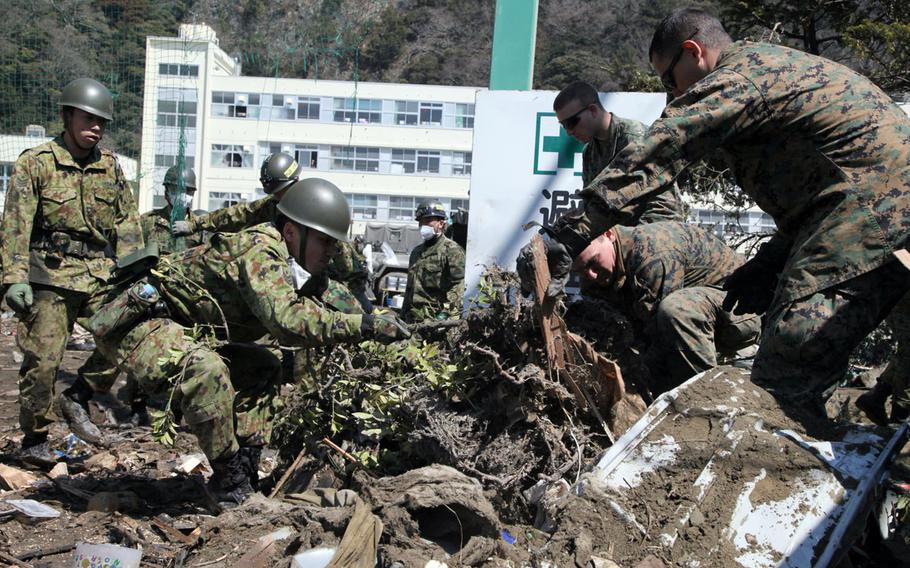
U.S. Marines and Japanese soldiers work together to clear debris at a school in Ishinomaki, Japan, April 1, 2011. The troops were participating in Operation Tomodachi, a joint humanitarian assistance operation in response to the 9.0-magnitude Tohoku earthquake and tsunami that struck northeastern Japan on March 11, 2011. (U.S. Marine Corps)
TOKYO — Japan has yet to accept a week-old offer of U.S. military aid for an area hit hard by a deadly 7.6-magnitude earthquake that struck on New Year’s Day.
Japan is not taking any assistance from other nations, a spokesman for Japan’s Ministry of Foreign Affairs said Thursday by email.
“The Japanese government is currently making every effort to save lives and provide assistance to disaster-stricken areas, and we are uniformly not accepting any personnel and material assistance from various countries and regions at this time considering the situation in the area as well as the work required to build a system to accept such efforts,” the spokesman wrote.
Some Japanese officials may speak to the media only on condition of anonymity.
The quake collapsed buildings, shredded highways and, as of Thursday, has killed 213 people in towns and villages on the Noto Peninsula, according to reports in Japanese media.
“We will consider how to respond to offers for assistance from each country/region, taking into account the above policy, as well as the damage situation and local needs,” the Foreign Affairs spokesman said.
U.S. forces readied logistical support, food and other supplies for quake victims, U.S. Ambassador to Japan Rahm Emanuel wrote Jan. 5 on X, formerly Twitter. U.S. helicopters would help move resources to and from the disaster zone, he told the Kyodo News agency the previous day.
Japanese citizens’ pleas for U.S. support in the disaster’s aftermath have also appeared on X.
“I clearly remember the U.S. helicopters flying around finding areas that were isolated without assistance and bringing aid during Operation Tomodachi during the Great East Japan Earthquake, but why can’t they do it this time?” @jirosukyHDD wrote Monday in Japanese.
More than 20,000 American troops worked alongside their Japanese allies during Operation Tomodachi, the U.S. military response in March 2011 to a magnitude 9 earthquake in northeastern Japan, the most powerful the country has ever recorded.
“To those affiliated with the U.S. Forces: Please provide assistance,” @samurai_634 wrote Sunday in Japanese. “The assistance remains insufficient even a week after the earthquake occurred. Please deploy on an emergency to the coasts of Noto Peninsula and provide transport assistance from the waters.”
Yokosuka Naval Base, home of the U.S. 7th Fleet in Japan, responded Wednesday in Japanese on its official X account: “U.S. Forces cannot act alone but upon request from the Japanese government, the U.S. Forces can coordinate with the government, draw on past experience, and cooperate with the Self-Defense Forces. Although the situation is severe, we hope that the necessary support will reach everyone as soon as possible. Our hearts are with you all.”
A spokesman for U.S. Forces Japan, Air Force Maj. Thomas Barger, by email Wednesday said, “We remain ready to support as needed.”
Emanuel and President Joe Biden offered messages of sympathy following the earthquake.
The U.S. Embassy in Tokyo announced a $100,000 aid package Jan. 5 that includes essential resources such as blankets, water, and medical supplies through Pace Winds Japan, a nongovernmental organization.
“We sincerely appreciate the condolences and offers of support from the United States and other countries and regions in response to the damage caused by the recent Noto Peninsula earthquake, which are encouraging to the affected areas,” the Foreign Ministry spokesman said.